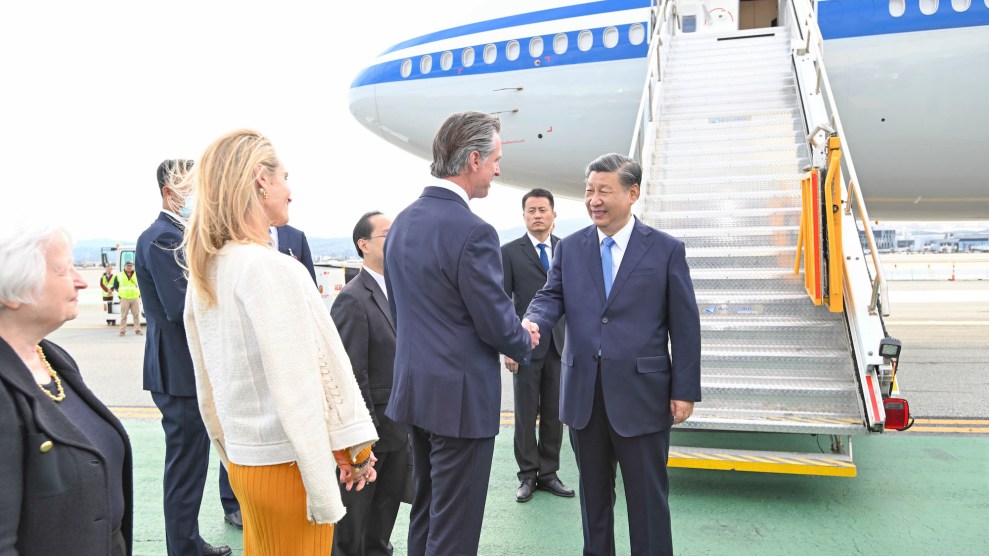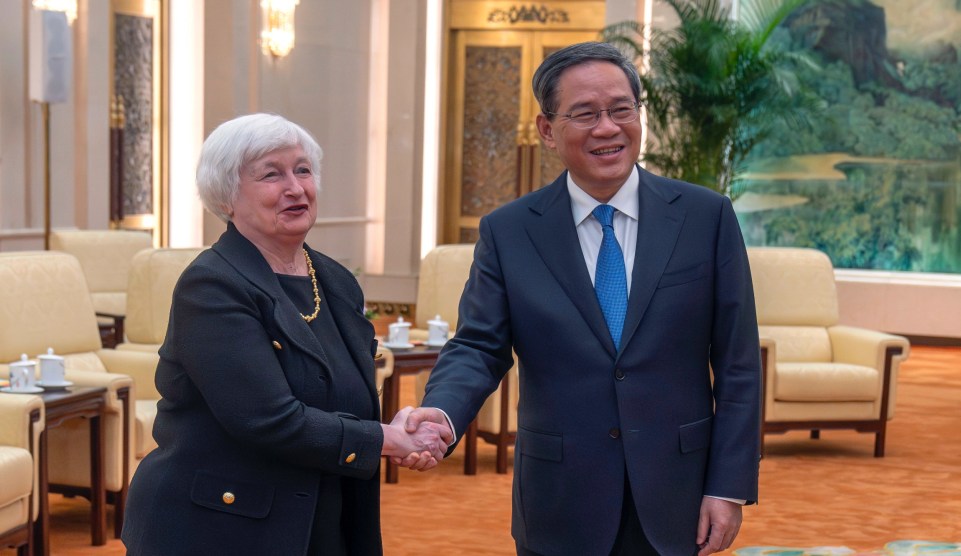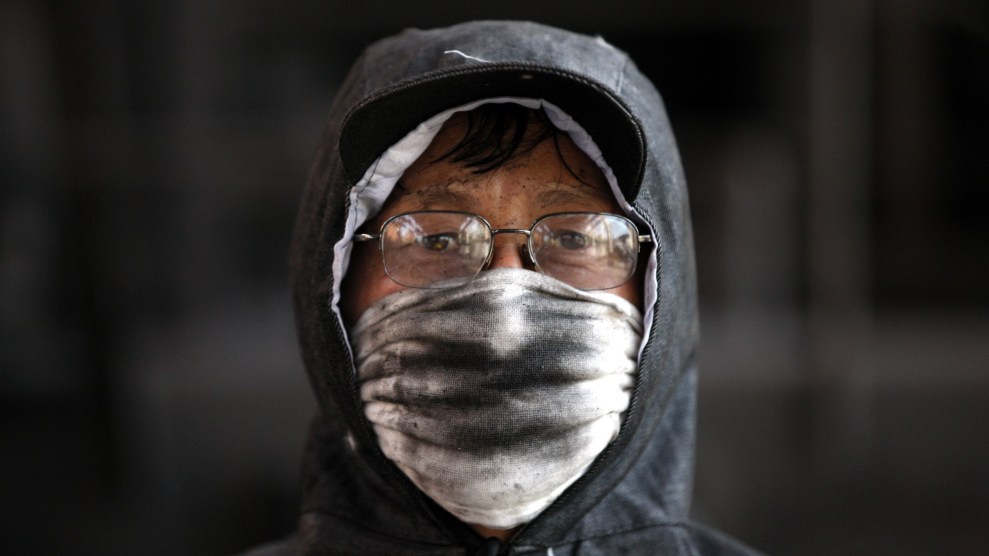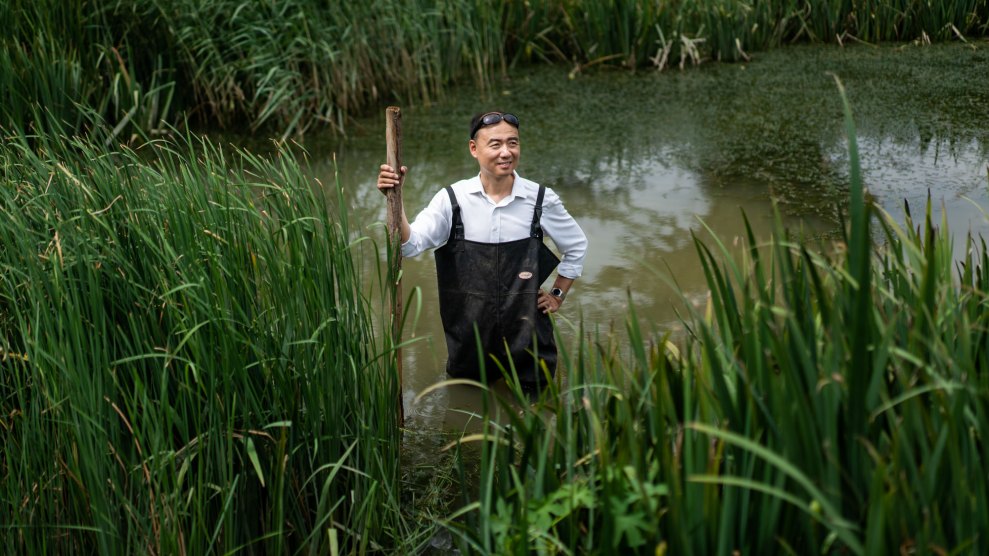
Chinese President Xi Jinping being greeted by California Gov. Gavin Newsom as he arrives to San Francisco for APEC. Xie Huanchi/Xinhua/Zuma
This story was originally published by the Guardian and is reproduced here as part of the Climate Desk collaboration.
China and the US have pledged to work together more closely to fight global heating, declaring the climate crisis “one of the greatest challenges of our time,” hours before a key meeting in San Francisco between Joe Biden and Xi Jinping.
The announcement further fuels hopes that the two nations can mend relations after years of turmoil over issues including trade, human rights and the future of Taiwan.
In a joint statement after climate talks in the US, they pledged to make a success of a crucial UN climate summit starting at the end of this month in Dubai and recommitted to the 2015 Paris Climate Accord goals of holding global heating to “well below” 2 C, while pursuing efforts to limit the increase to 1.5 C.
“The United States and China recognize that the climate crisis has increasingly affected countries around the world,” the statement said. “They will work together…to rise up to one of the greatest challenges of our time for present and future generations of humankind.”
Xi and Biden’s summit is the first face-to-face meeting between the two leaders in a year and has been billed by US officials as an opportunity to reduce friction in what many see as the world’s most dangerous rivalry.
It comes on the back of a series of agreements aimed at setting a floor for the relationship. As well as the climate agreement that was published on Tuesday, Beijing and Washington are expected to reach a deal on controlling the flow of fentanyl from China to the US.
The US is also hoping to reopen military dialogues, which have largely been frozen since the visit of Nancy Pelosi, the then speaker of the House of Representatives, to Taiwan last year.
With elections in Taipei in January expected to strain cross-strait relations, Taiwan will also be high on the agenda for the Xi-Biden talks. Beijing is keen to challenge what it sees as a worrying shift in the Biden administration towards more support for the self-governing island, which China claims as part of its territory.
In advance of the summit, Chinese state media have adopted a warmer tone towards the US. The official Communist party newspaper, the People’s Daily, said in its overseas edition: “The Chinese people will never forget an old friend, and that’s an important message we want to send to the American people.” The often confrontational Global Times newspaper called for the two countries to cooperate.
One of the most notable features in the climate statement was that both countries would commit to “economy-wide” nationally determined contributions across all greenhouse gases, not just CO2. China has previously resisted the idea of specifying which parts of the economy would be covered by its climate pledges.
Li Shuo, the incoming director of the China Climate Hub at the Asia Policy Institute, said the language of “economy-wide” NDCs “implies a pretty stringent framework” that “will help enhance the transparency of China’s emissions,” a goal that the US has long pushed for.
The US and Chinese climate envoys, John Kerry and Xie Zhenhua, had met this month at the Sunnylands resort in California in an attempt to restart stalled cooperation. Experts agree that keeping the Paris goals in reach will require an enormous collective effort to reduce greenhouse gas emissions this decade.
Xi arrived in the US for his first visit in six years on Tuesday and waved from atop a passenger staircase attached to his Air China plane before descending to meet US officials waiting on the tarmac, including the treasury secretary, Janet Yellen, and the US ambassador to China, Nicholas Burns.
He then got into his Chinese Hongqi, or “Red Flag”, limousine and departed the airport for the city, where demonstrations are expected both supporting and protesting against his visit.
He is due to meet Biden at an undisclosed location in San Francisco on Wednesday, a meeting that is expected to last at least four hours, and then attend the annual summit of the Asia Pacific Economic Cooperation forum.
Biden has said his goal in his talks with Xi will be to improve the relationship with China after a period of strained ties. He said he would seek to resume normal communications between the two superpowers, including military-to-military contacts. The White House national security spokesperson, John Kirby, told reporters that Biden and Xi would also talk about the Israel-Hamas conflict in Gaza as well as US efforts to support Ukraine.
Speaking in the hours before Xi’s arrival, the US secretary of state, Antony Blinken, addressed ministers of the 21-member APEC and stressed that the US believed in “a region where economies are free to choose their own path…where goods, ideas, people, flow lawfully and freely”.
Blinken did not mention China in his remarks, but his language echoed US rhetoric in recent years in which Washington has accused Beijing of bullying smaller countries in the Indo-Pacific and trying to undermine what the US and its allies call the existing “rules-based” order.
The US trade representative Katherine Tai, who with Blinken opened the APEC ministerial session, said the San Francisco meeting came at a time of “great uncertainty and challenges” for the region. She noted increasing geopolitical tensions, fragile supply chains and a worsening climate crisis.
Biden said the US did not want to decouple from China but wanted to change the economic relationship for the better. His administration has made a push to “de-risk” some critical US supply chains from China as the two countries’ economic and military competition has grown.
But it has been careful to assure countries in the region, including China, that the US does not seek complete economic separation, a notion that has fueled concerns among Washington’s partners and allies of a superpower showdown that would upend the global economy.
Several hundred mostly pro-China demonstrators carrying Chinese flags gathered outside the Chinese delegation’s hotel before Xi’s arrival in the US. In recent weeks Chinese diaspora associations and the alumni networks of Chinese universities have been recruiting members to welcome Xi’s visit.
Larger protests, including by rights groups critical of Xi’s policies in Tibet, Hong Kong and toward Muslim Uyghurs, are expected to gather near the summit venue on Wednesday.
With Reuters and Agence France-Presse










